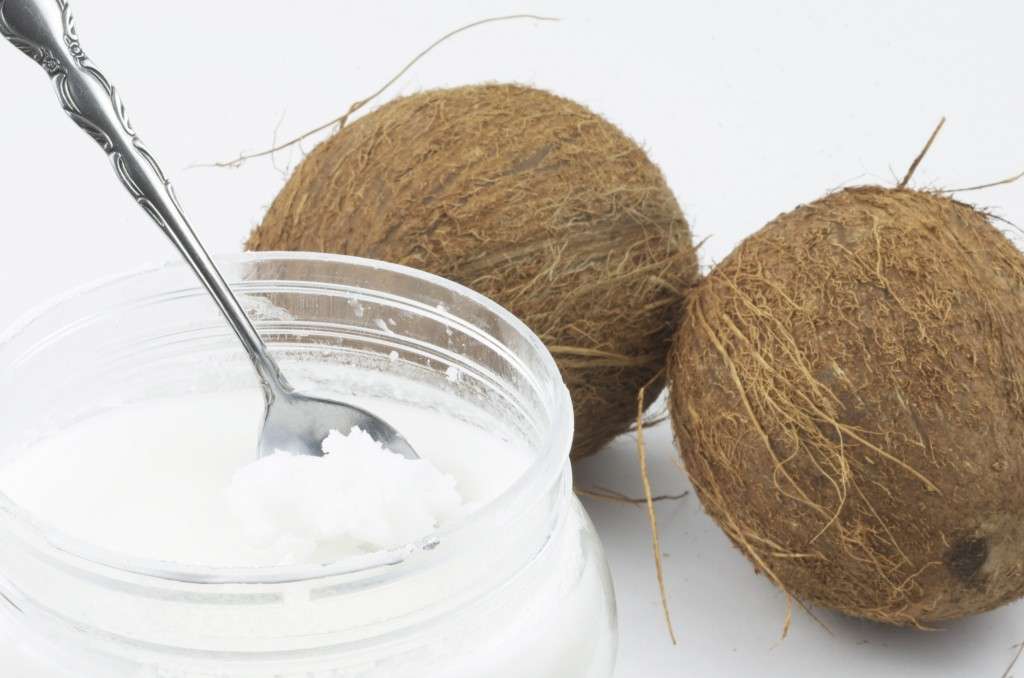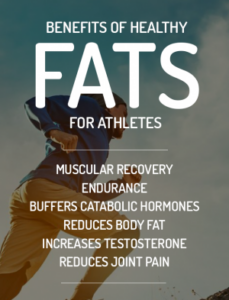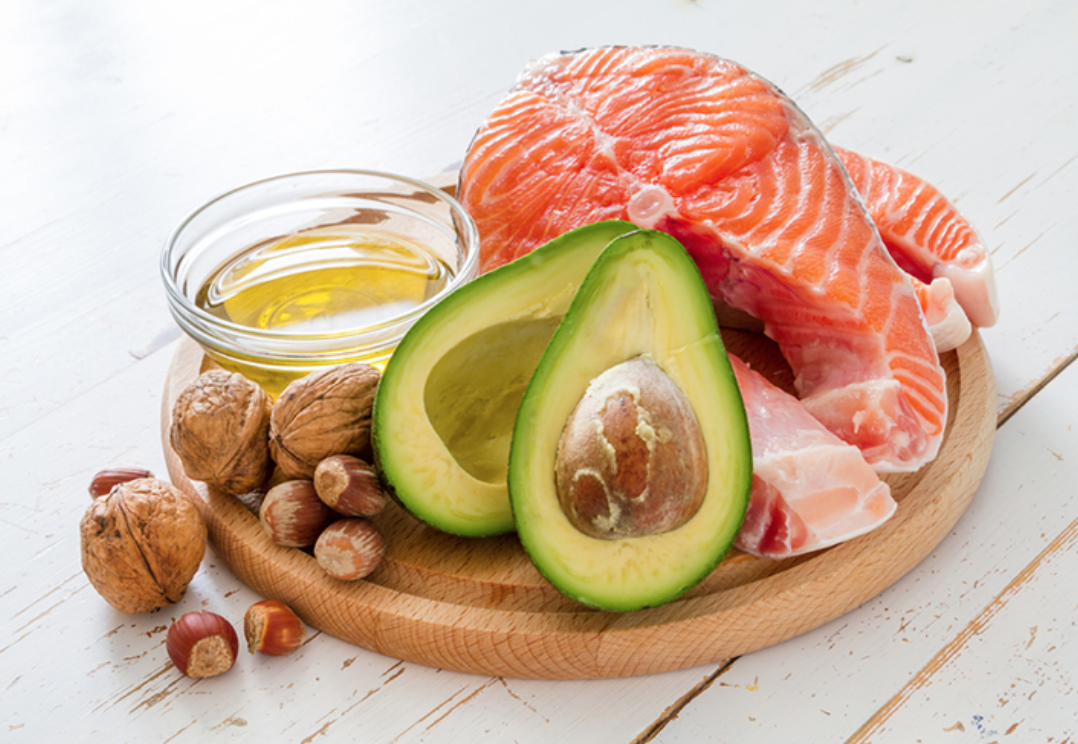March 20, 2020
Originally posted in December 2018, updated and made even more awesome in March 2020
WHY YOU NEED GOOD FATS
(even more if you’re an athlete!)

Here’s what we’re laying down…
- Not all fat is created equally, saturated vs. unsaturated fats
- Coconut oil and MCTs
- All about the omega 3 & 6 fats (EFAs)
- When good fats turn bad
- What oils to cook with
- Proven benefits of fats for athletes
- Recap summary of what you really need to know
.Fats can be a complex and confusing topic. What’s healthy, what’s not; how much should I have, do they make me fat, can heating them be dangerous, how much is too much? These and other questions will hopefully be answered here without too much complicated science.
First of all, fats are NOT bad!
As you will see in the following paragraphs, fats are absolutely essential to the functioning of virtually every system in your body. Without adequate dietary essential fatty acids, every system in the body that relies on them would be jeopardized – and that’s a lot of important stuff!
- energy production
- structure and function of all cells
- modulation of cell division
- maintenance of inflammatory processes
- transportation of cholesterol
- hormone production and balance
- neurotransmitter function
- skin permeability
Because the role of good fats in the body is primarily as a result of its protective sheath around all nerve fibres and its anti-inflammatory benefits – and because inflammation is now being recognized universally as the primary culprit behind ALL disease and illness (whoa, right?!) we can confidently say that healthy fats have earned their reputation as the ultimate protector in your body.
Need help determining what your macronutrient needs are for your goals and unique physiology?
We can help! Get in touch today
NOT ALL FAT IS CREATED EQUALLY
To remain healthy, our bodies need both saturated and unsaturated fatty acids. When fat is fully saturated (meaning it is holding all of the hydrogen it can – here I go using that chemistry that I swore I never would!), it interacts the least with other molecules in the body. Thus, we say it is the most stable. That is what makes saturated fats helpful to us structurally – because they help stabilize cell membranes, making the cell less susceptible to damage. It is damage to cells that ultimately lead to illness and disease.
Therefore, YES even saturated fats have a use in our bodies. Although these fats have gotten a bad rap in older reports, new research has shown that some saturated fats (shorter-chain ones) offer important health benefits. Butter, for example, contains butyric acid and is associated with reduction of cancer risk.
Dr. Mercola states that the claim that all saturated fat should be eliminated is “a misguided fallacy that has been harming our health for the last 30-40 years”. Saturated fats found in butter and coconut oil (myristic acid and lauric acid) play key roles in immune health. Loss of sufficient saturated fatty acids in white blood cells hampers their ability to recognize and destroy foreign invaders, such as viruses, bacteria, and fungi.
Additionally, certain saturated fats, particularly those found in butter, coconut oil, and palm oil function directly as signalling messengers that influence metabolism, including such critical jobs as the appropriate release of insulin.
Of course like all things, moderation is the key. The inclusion of a few small servings each week of saturated fats from lean cuts of organic red meat and tropical oils (coconut oil) will provide these benefits, as well as provide a healthy dose of iron, selenium, zinc and many B-vitamins. Likewise, the occasional small pat of grass-fed butter provides a healthy dose of this saturated fat along with some vitamin A and D2.
1 Source: http://articles.mercola.com/sites/articles/archive/2012/05/31/coconut-oil-for-healthyheart

Curious about coconut oil?
Coconut oil is a whole food with a variety of saturated fats, including a combination of MCTs and LCTs (medium chain triglycerides and long chain triglycerides), so it is solid at room temperature. What makes MCTs unique is that they bypass the route that other fats take to be broken down in the body, and this can lead to a number of reported effects/benefits in the body.
Research is plenty, but conflicting on the benefits of using MCT for weight loss, sports performance or other health or athletic improvements. Check out our blog here where we explore what the science shows to date on MCT oil.
ALL ABOUT OMEGAS / EFAs
Omega-3 and 6’s are types of unsaturated fats, and are often referred to as the essential fatty acids (EFAS). Our bodies are unable to synthesize these types of fatty acids on their own, and so they must be obtained from the diet. These fats are essential to the maintenance of all cell membranes, for normal growth, energy production, regulating inflammatory processes, healthy arteries and nerves, brain function and mental health, regulation of blood sugar levels, metabolism and weight control, transport and absorption of minerals, hormone regulation, cardiovascular support, and so much more.
You can understand why these healthy fats are so vital in our diets, and why restricting them (for fear of “getting fat”) is downright dangerous! Because fatty acids play a role in virtually every organ and system in the body, just imagine the consequences of deficiency in the body.
Symptoms of a deficiency in these vital fats could include brain fog, dry skin and rashes, impaired digestion, intestinal disorders, brittle hair, infertility, irregular menstrual periods, sore muscles and joints, arthritis, poor wound recovery, reduced athletic performance, reduced cognitive abilities, poor memory, depression, and anxiety.
We need both omega-3 and omega-6 fats, however the ratio is a much debated topic. The general consensus is that a ratio of about 1:1 is ideal for optimal health. Although there are health benefits to omega-6 fats (supports bone health, reduces nerve brain, regulates metabolism, just to name a few), they are also pro-inflammatory. Most omega-6 polyunsaturated fatty acids (PUFAs) are the building blocks of several types of inflammatory molecules, whereas the omega-3 fats are anti-inflammatory.
Today’s dietary habits equate to a ratio as high as 20:1 omega-6 to omega-3. This is largely due to the tremendous increase in consumption of commercial packaged products that include types of omega-6 oils.
Hence, the message is loud and clear – we need more omega-3 in the diet, not necessarily because omega-6 is bad, but simply because not enough of the anti-inflammatory 3 is consumed.
OMEGA-6 FATS
Most common dietary sources are processed vegetable oils (corn, canola, safflower, soy), margarine and shortening. Pick up virtually any packaged, processed food on the grocery shelf and you’ll find these highly processed and inflammatory fatty acids. Because society eats such an abundance of packaged foods, you can see how they get far too much omega-6 in the diet.
Cleaner, more natural forms of omega-6 fatty acids can be found in dairy, eggs, beef and chicken.
OMEGA-3 FATS
Anti-inflammatory omega-3 fatty acids are in a vast variety of whole foods, including both animal and vegetable sources. A combination of both is optimal to get sufficient omega-3s.
Plant based sources of omega-3 fats include green leafy vegetables, nuts, tofu, flaxseed.
Animal based sources of omega-3 fats are wild salmon, mackerel, black cod, halibut, rainbow trout, shellfish, sardines, herring and tuna.
WHEN GOOD FATS TURN BAD
Remember how we said that saturated means that they’re holding all the hydrogen they can, and this makes them very stable in the body. Those healthy omega fats are unsaturated fats that are less stable and structured. They provide flexibility to our cell membranes and allow them to stay in dynamic communication with the rest of our bodies as needed. However, this flexibility in the fats means they are much more susceptible to damage, especially when exposed to heat, light and air.
It is during exposure to these conditions that nasty radicals move in and turn the fat “rancid”, rendering it unable to function properly in the body. When this happens, not only does the fat not work as it should, but it actually becomes a threat to our bodies.
Associated health risks come from the production of potentially toxic compounds that are created from rancid fats and they’re associated with neurological disorders, heart disease and cancer. This new form of fat, called a RANCID FAT, is one way in which a good fat turns into a bad fat.
To minimize this type of damage, keep your unsaturated fats away from heat, light, and air by storing them in cool dark places, and in airtight containers. This includes nuts and seeds, and nut butter if they’re not going to be consumed within about a month or so.
What about that heat?
Certain fats shouldn’t be used for cooking. We give you the low down here.
Because unsaturated fats are less stable, the food industry is all about extending their shelf life with a process called hydrogenation – which makes it act a little more like a stable saturated fat by artificially adding in some hydrogen gas. This does in fact make it a little less delicate and create a longer shelf life, but the process lowers the quality of the oil and converts some of its components into an entirely new form of fat called TRANS FATS. This dangerous new fat increases blood cholesterol and LDL cholesterol, and increases the risk of atherosclerosis (hardening of the arteries). Trans fat is considered by many doctors to be the worst type of fat you can eat.
The food industry also adds synthetic antioxidants BHA (butylated hydroxyanisole) and BHT (butylated hydroytoluene) to our unsaturated plant oils as a food preservative to help reduce the oxidative damage. However, there are numerous studies suggesting that these chemicals are possible carcinogens, hormone disruptors and more. These chemicals should be avoided in your diet. A more natural alternative is to add your own antioxidant vitamin E oil to your unsaturated oils at home to preserve them. You can buy vitamin E oil at many natural foods markets.
Some meat and dairy products contain small amounts of naturally occurring trans fat – but this is not where the concern lies. Most trans fat is formed through the above noted industrial process that adds hydrogen to vegetable oils, which causes them to become more solid at room temperature and particularly, extends the shelf life (so that it spoils and become rancid less quickly). This manufactured form of trans fat, known as partially hydrogenated oil, is found in a variety of processed food products. Some restaurants use partially hydrogenated vegetable oil in their deep fryers because it doesn’t have to be changed as often as do other oils.
Check labels for trans fats. If a food has less than 0.5 grams of trans fat in a serving, the manufacturer can label it as 0 grams. This hidden trans fat can quickly add up, especially if you eat several servings of multiple foods containing less than 0.5 grams on a regular basis. When you check the food label, also check the food’s ingredient list for partially hydrogenated vegetable oil, which indicates that the food contains some trans fat, even if the amount is below 0.5 grams.
Common food items that contain hydrogenated or trans fats include packaged snacks and baked goods, fast food, creamers and margarine.
6 PROVEN BENEFITS OF HEALTHY FATS FOR ATHLETES

Muscular Recovery: Numerous studies show athletes supplementing with omega-3 fatty acids have significant reductions in lab markers for muscular inflammation (IL-6 and CRP). Other studies show 20% reductions in delayed onset muscle soreness. Faster recovery means you’re able to get back to training sooner (also great news for high level athletes who have two-a-day sessions!)
Endurance: Two weeks of MCT consumption showed suppressed elevations in lactic acid compared to placebo groups. Increased lactic acid threshold means greater exertion and performance benefits.
Buffers Catabolic Hormones: Cortisol and adrenaline are stress hormones in the body that are catabolic (break down tissue/muscle). Omega 3 intake is shown to buffer these hormones, thereby improving an athlete’s energy levels and recovery.
Reduces Body Fat: Studies show a significant improvement in insulin sensitivity with fish oil supplementation – this is directly associated with reductions in body fat and improved body composition.
Increase Testosterone: A Maryland campus of Nat’l Cancer Int. study found that after 10 weeks of a healthy fat and fibre diet, subjects showed increases in testosterone of 13%, while simultaneously reducing estrogen by up to 28%! These hormonal changes activate stimulations in muscle mass growth.
Improved Joint Pain: Research shows the relationship between omega-3 healthy fats and reduced inflammatory markers (interleukin-6 and TNF-a). Additionally, O3 increases compounds that reduce inflammation in the body (resolvins and protectins) à good news for inflammatory conditions and for support joint health for athletes.
Big FAT Recap
- Avoid hydrogenated and trans fats at all costs. They destroy cells in the body. Most all processed and fast foods contain some of these bad fats.
- Omega-6 fats are needed by the body in small amounts, but the typical north American diet has too many of them. This is because the vegetable oils used in most packaged foods contain omega-6 fats. The solution: reduce packaged foods. Cleaner, more natural forms of omega-6 fatty acids can be found in dairy, eggs, beef and chicken.
- Increase the anti-inflammatory Omega-3 fats in your diet by consuming more wild fish and seafood. Plant based sources include green leafy vegetables, nuts, tofu, and flaxseed.
- To protect your healthy fats and keep them from turning rancid (going bad), keep nuts and seeds – including nut butter – in the fridge if you won’t be eating them within a month or so.
- Only cook with oils that are stable enough to maintain structural integrity when exposed to heat. This includes grapeseed oil, coconut oil, and olive oil (on a lower to moderate heat setting).
- The universal daily recommended amount of fats in the diet is 20-30% of total daily calories. To combat the additional inflammation and oxidative damage of the athlete and recreational fitness enthusiast alike, the team at Build recommends no less than 25%.
- Get your fats from whole food sources such as avocados, raw nuts and seeds, egg yolks, and unrefined oils like extra virgin olive oil, coconut oil, avocado oil, and grapeseed oil.

Healthy Fats: The Perpetual Protector
The entire contents of this website are based upon the opinions of Build Holistic Nutrition. Please note that Build Nutrition is not a dietitian, physician, pharmacist or other licensed healthcare professional. The information on this website is NOT intended as medical advice, nor is it intended to replace the care of a qualified health care professional. This content is not intended to diagnose or treat any diseases. Always consult with your primary care physician or licensed healthcare provider for all diagnosis and treatment of any diseases or conditions, for medications or medical advice, as well as before changing your health care regimen.
© BUILD NUTRITION 2026. ALL RIGHTS RESERVED. PRIVACY POLICY
Go ahead, creep us on social. You know you want to!
